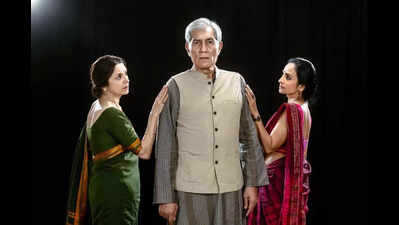Trending
‘Autobiography’ to take audiences on a journey through time & truth
Pune: Some stories never really fade, they just wait for the right moment to stage a comeback. Like the play, ‘Autobiography,' directed and staged by acclaimed theatre director and actor Lillete Dubey in 1996.
Dubey will direct as well as perform in the play once again after nearly three decades, reshaping the production for contemporary audiences.
Reflecting on her first tryst with the play, Dubey recalled an interaction with some expats who came to see the production back then. "They came backstage and praised the script, only to be surprised when I told them it was written by Indian playwright Mahesh Elkunchwar. It was an eye-opener about the global perception of Indian theatre," she said, emphasizing the depth of homegrown storytelling talent that often escapes global recognition.
The decision to restage ‘Autobiography' wasn't made overnight. "I always wanted to do the play again, but something else always came up — other productions, film commitments, or sheer logistics," she said. The tipping point came after her exhausting work on ‘Jaya', a star-studded musical based on Mahabharata. "I needed a break after working on production of such a grand scale and wanted to do something intimate yet powerful. ‘Autobiography' felt like the perfect contrast," said Dubey.
Dubey highlights subtle but crucial updates. "We've slightly trimmed the script for pace and infused some Marathi words here and there to give it an authentic flavour. The characters, being highly-educated Punekars, naturally switch between English and Marathi. Unlike some Indian plays where English dialogue feels forced, here it flows organically."
Rebuilding the production wasn't just about revisiting old material; it meant starting completely afresh. "New actors, a new set, new lights— we started from scratch again. Every aspect was reconsidered to ensure it resonates with today's audience. After all, human nature hasn't changed, only our internet speeds have," said Dubey.
The updated production debuted at a theatre festival in Bangalore in Jan this year before moving to Mumbai's Royal Opera House the following month, where it received a standing ovation. "I was slightly anxious because this play was written in 1989 as a book, then performed as a play in 1996. Would it still connect? But human relationships are timeless. Whether it's the dilemmas of a Shakespearean tragic hero, the politics of family inheritance, or the passive-aggressive exchanges between couples, the audience engages with emotions, conflicts, and truths."
"Last time, I played the younger sister. Now, I step into the role of the wife. It's fascinating to reinterpret the same story from a different perspective. For me, the magic lies in the process. From script refinement to rehearsals, every step is exhilarating. Theatre is never just about performance—it's about constant reinvention. And, of course, making sure no one forgets their lines," said Dubey.
The play will be staged at Nehru Memorial Hall, Camp, on April 6 at 6 pm.
Pune: Some stories never really fade, they just wait for the right moment to stage a comeback. Like the play, ‘Autobiography,' directed and staged by acclaimed theatre director and actor Lillete Dubey in 1996.
Dubey will direct as well as perform in the play once again after nearly three decades, reshaping the production for contemporary audiences.
Reflecting on her first tryst with the play, Dubey recalled an interaction with some expats who came to see the production back then. "They came backstage and praised the script, only to be surprised when I told them it was written by Indian playwright Mahesh Elkunchwar. It was an eye-opener about the global perception of Indian theatre," she said, emphasizing the depth of homegrown storytelling talent that often escapes global recognition.
The decision to restage ‘Autobiography' wasn't made overnight. "I always wanted to do the play again, but something else always came up — other productions, film commitments, or sheer logistics," she said. The tipping point came after her exhausting work on ‘Jaya', a star-studded musical based on Mahabharata. "I needed a break after working on production of such a grand scale and wanted to do something intimate yet powerful. ‘Autobiography' felt like the perfect contrast," said Dubey.
The play, set in Pune, follows a celebrated writer as he navigates his relationships with a young, sharp-tongued PhD student, his estranged wife, and her sister. It explores layered perspectives, shifting between past and present, reality and fiction. "The play explores different versions of truth through the characters' experiences. The same events are experienced differently by different characters, and the audience must piece it all together," she said.
Dubey highlights subtle but crucial updates. "We've slightly trimmed the script for pace and infused some Marathi words here and there to give it an authentic flavour. The characters, being highly-educated Punekars, naturally switch between English and Marathi. Unlike some Indian plays where English dialogue feels forced, here it flows organically."
Rebuilding the production wasn't just about revisiting old material; it meant starting completely afresh. "New actors, a new set, new lights— we started from scratch again. Every aspect was reconsidered to ensure it resonates with today's audience. After all, human nature hasn't changed, only our internet speeds have," said Dubey.
The updated production debuted at a theatre festival in Bangalore in Jan this year before moving to Mumbai's Royal Opera House the following month, where it received a standing ovation. "I was slightly anxious because this play was written in 1989 as a book, then performed as a play in 1996. Would it still connect? But human relationships are timeless. Whether it's the dilemmas of a Shakespearean tragic hero, the politics of family inheritance, or the passive-aggressive exchanges between couples, the audience engages with emotions, conflicts, and truths."
"Last time, I played the younger sister. Now, I step into the role of the wife. It's fascinating to reinterpret the same story from a different perspective. For me, the magic lies in the process. From script refinement to rehearsals, every step is exhilarating. Theatre is never just about performance—it's about constant reinvention. And, of course, making sure no one forgets their lines," said Dubey.
The play will be staged at Nehru Memorial Hall, Camp, on April 6 at 6 pm.
End of Article
FOLLOW US ON SOCIAL MEDIA










